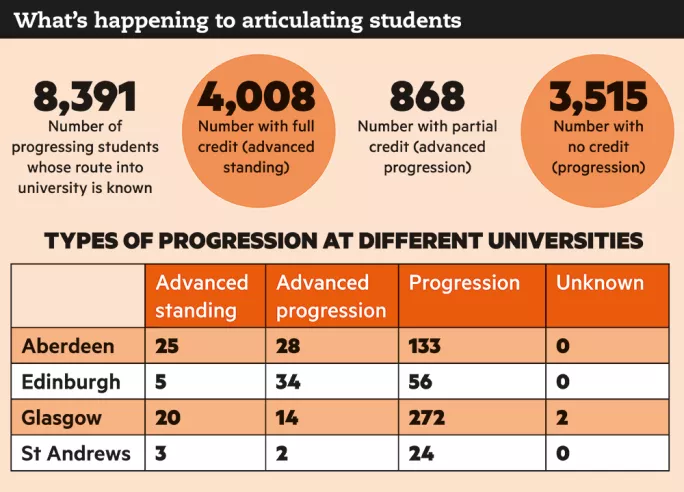Over a third of articulating students get ‘no credit’

More than a third of students moving from college to university get no credit for their previous study, TESS can reveal.
Figures obtained from the Scottish Funding Council show that, of the 8,391 students who articulated into Scottish universities in 2014-15, and for whom a destination is known, more than 3,500 received no credit, while less than half (4,008) received full credit, allowing them to complete a degree in four years.
The number is lower at Scotland’s ancient universities. Of the roughly 300 students who moved into the University of Glasgow from colleges, only 20 got full credit, or advanced standing, for their prior learning. And at the University of Edinburgh, only five of the 95 students who entered from colleges in 2014-15 did so with full credit. The University of St Andrews had 29 students from college start courses that year - only three with full credit.
Articulation has long been hailed as a key tool for widening access to university. Students holding an HND should be able to move straight into the third year of a relevant university degree after their two years of college study, while those with an HNC should be able to move straight into second year.
Patchy progress
At City of Glasgow College, which had the largest number of articulating students, 1,429 students moved to universities. Of the 1,372 whose articulation route is known, however, only 735 received full credit for their prior learning at the college.
Last month, Scotland’s new commissioner for fair access to HE, Professor Sir Peter Scott, said articulation was one of the reasons why Scotland had a higher access rate for those from deprived backgrounds than England (“ ‘If you can make a difference, however small, you should’ ”, Insight, 17 February). He also hailed what he called local “cottage industries” of good practice in some parts of Scotland, which should be rolled out further.
But the figures show underperformance even in local cooperation between universities and colleges, particularly Scotland’s ancient universities.

Edinburgh College, which provided more than half of the total of articulating students at the University of Edinburgh, had only 54 students move on to a degree there - five with full credit.
However, the statistics also highlight some successful articulation routes. North East Scotland College had the highest proportion of its students enter university with full credit in 2014-15 (465 of the 731 for whom the route is known). Of those, 384 went on to Robert Gordon University.
Universities stressed that going straight into second or third year was not always the best option for a student. There were also cases where students moved into a different subject area altogether, meaning that they could not be given credit for their college study.
But Vonnie Sandlan, president of the NUS Scotland students’ union, said: “It’s appalling that the status quo allows universities to pick the level students can articulate into, creating wild inconsistencies across the country, with the usual suspects not pulling their weight when it comes to articulation.
Making students repeat years can force them into debt or deter them from going to university
“As well as adding years of repetition, making students repeat years of study can force them into additional financial debt, or even deter them from going to university at all.”
Paul Little, principal of City of Glasgow College, said: “Enhanced articulation with direct entry to degree years three and four across the sector is long overdue and would also eliminate any double funding. Surely it is now time for that level playing field?”
Annette Bruton, principal of Edinburgh College, said that it had successfully established routes with a number of universities, including Edinburgh Napier University. However, where these systems were not in place, repetition could be down to inconsistencies in the system, she added. There could also be an element of universities “not trusting us to have educated the students to the level required”.
Work has just begun
Alastair Sim, director of Universities Scotland, said the rate of students articulating with credit could be improved and universities were committed to doing so. The work, he added, had just begun.
“Widening access, student choice and benefit should be the factors that drive more articulation routes and full credit given to students,” Mr Sim said. “Creating successful routes between college and university is not quick or cheap. Saving money should not be the driving force behind this agenda if it is to work well for students.”
A spokesman for the University of Edinburgh said all entrants got full recognition of their prior learning and this could result in entry to year two or three of a degree if there was a good curriculum match.
“[HNDs and HNCs] are focused on vocationally oriented subjects and therefore don’t match all subjects across the university,” he added. “We also allow students eligible for advanced entry to enter in year one, as part of a large cohort of new students, if they believe this will be more conducive to establishing themselves as learners at the university.”
Scottish Funding Council interim chief executive Dr John Kemp said: “Through outcome agreements, we are encouraging universities to develop a system where more students get full credit and are well supported.”
You need a Tes subscription to read this article
Subscribe now to read this article and get other subscriber-only content:
- Unlimited access to all Tes magazine content
- Exclusive subscriber-only stories
- Award-winning email newsletters
Already a subscriber? Log in
You need a subscription to read this article
Subscribe now to read this article and get other subscriber-only content, including:
- Unlimited access to all Tes magazine content
- Exclusive subscriber-only stories
- Award-winning email newsletters